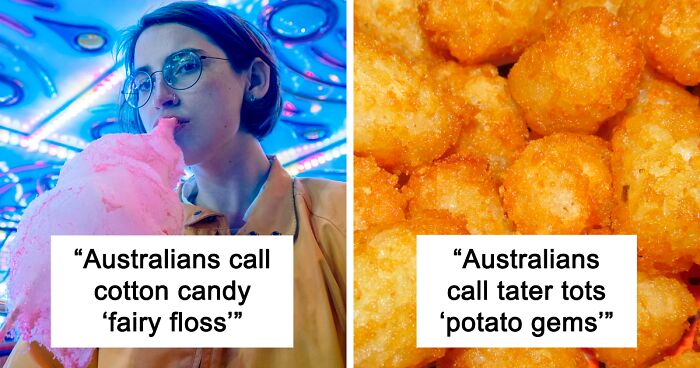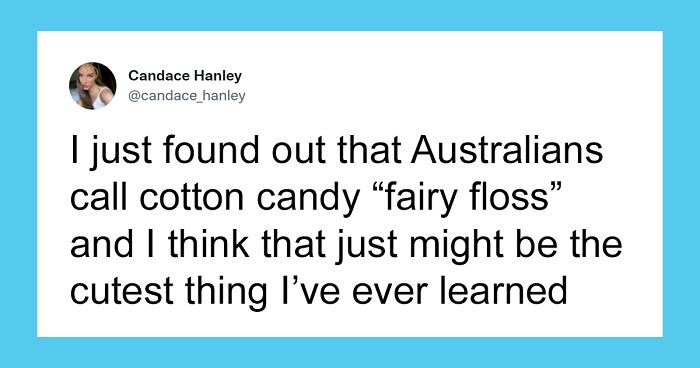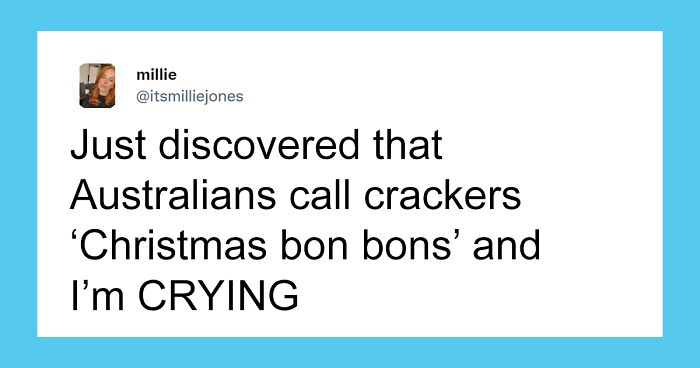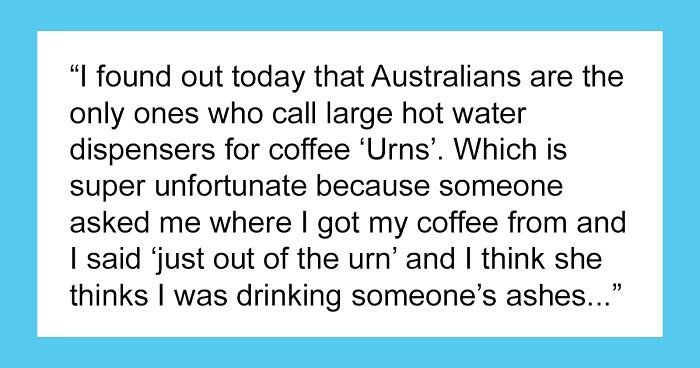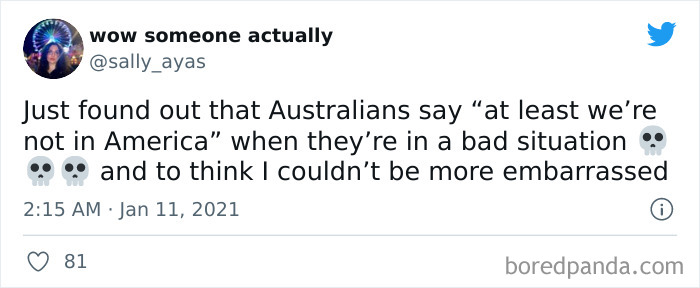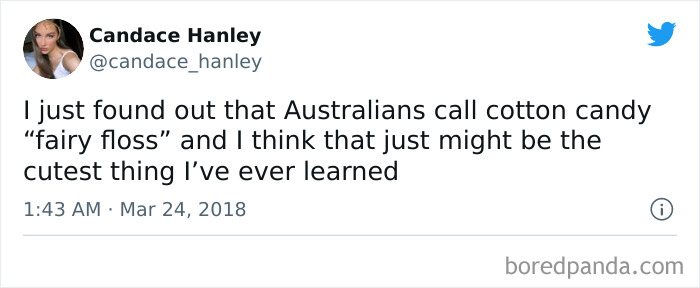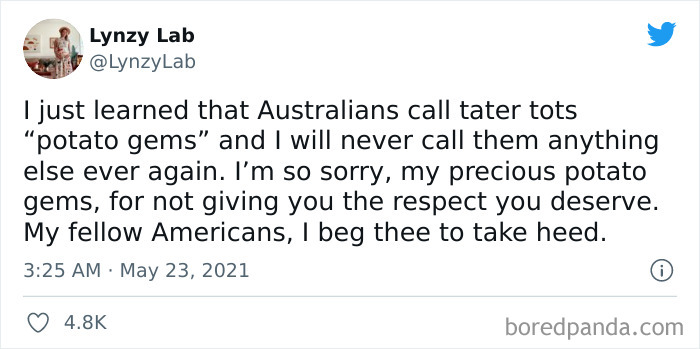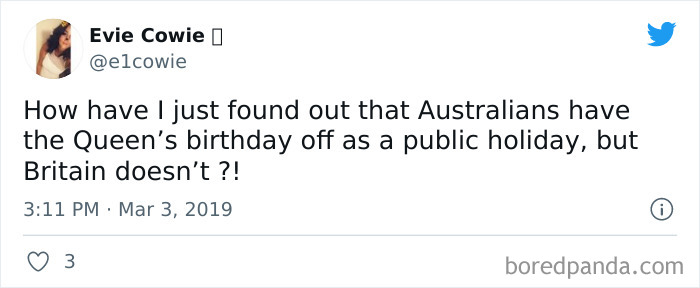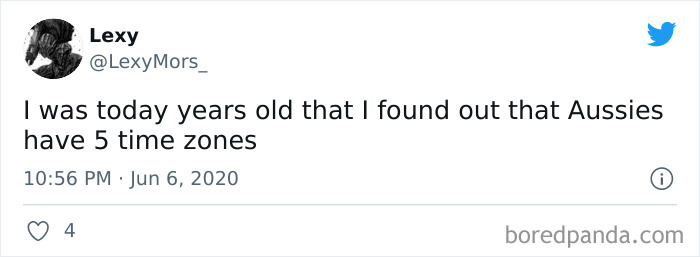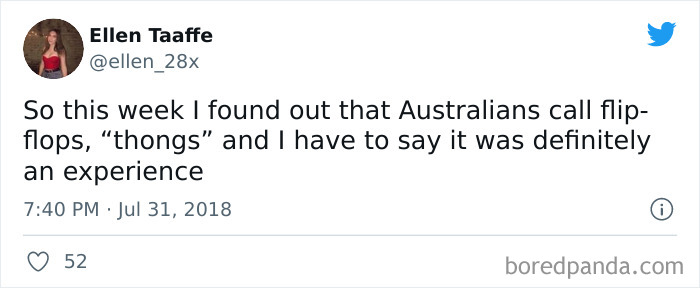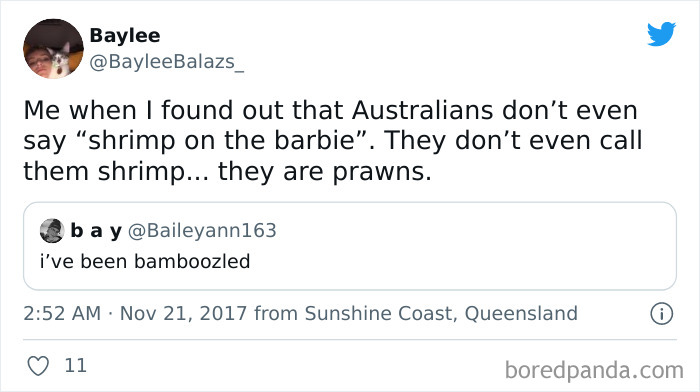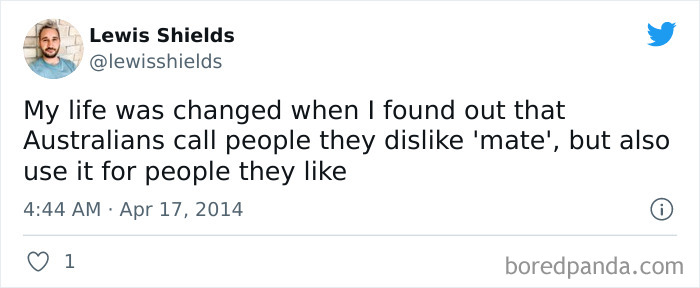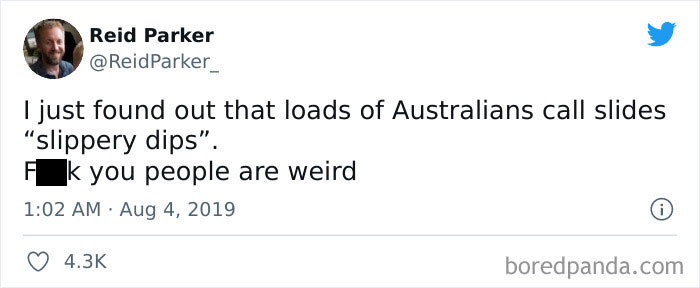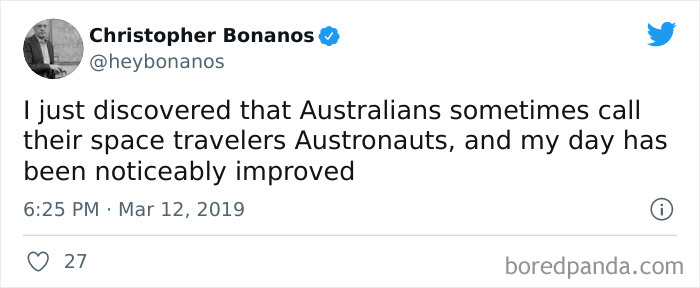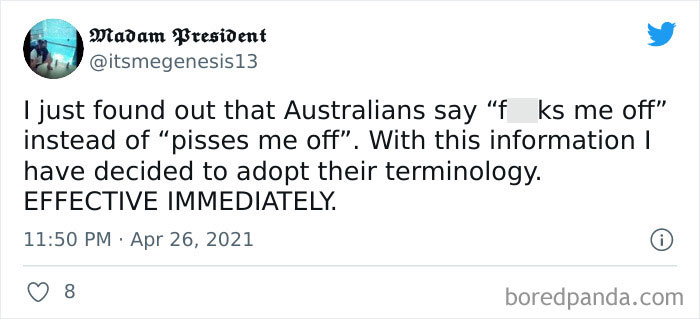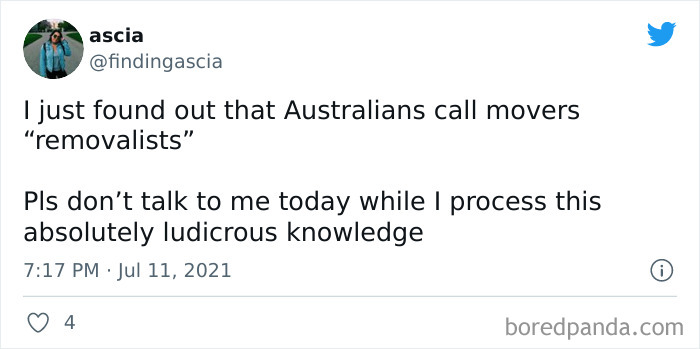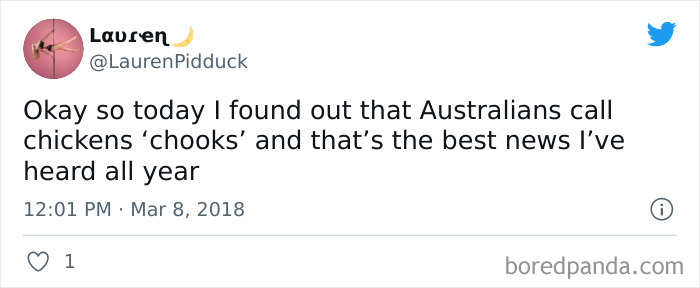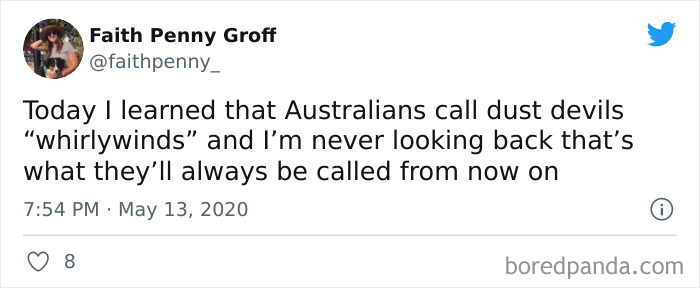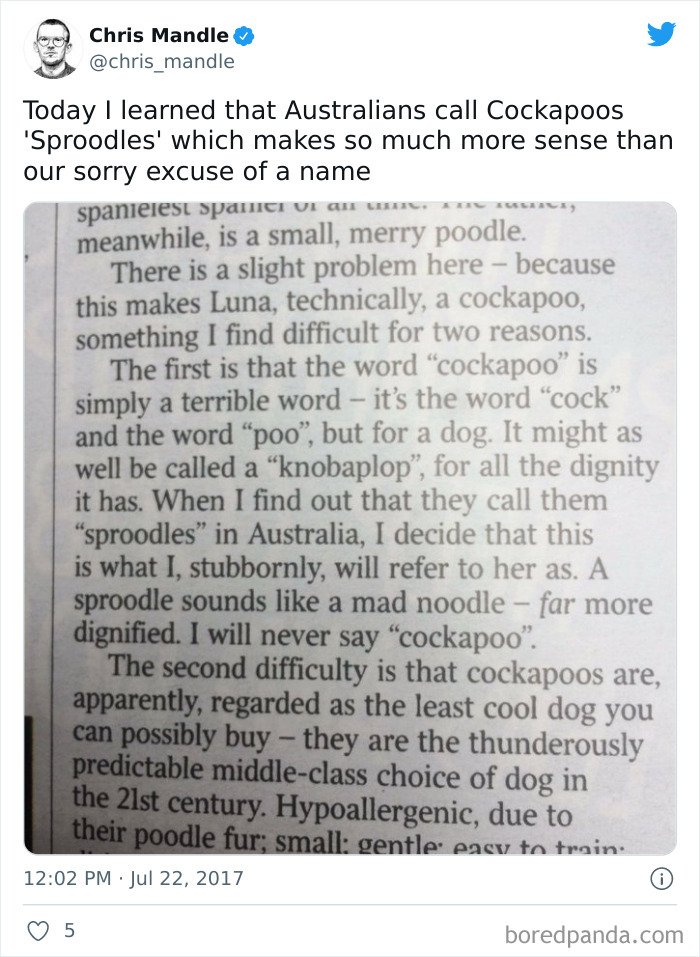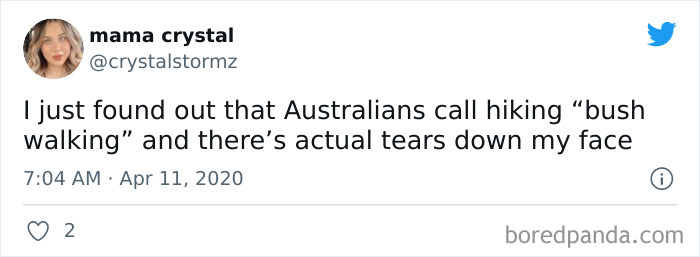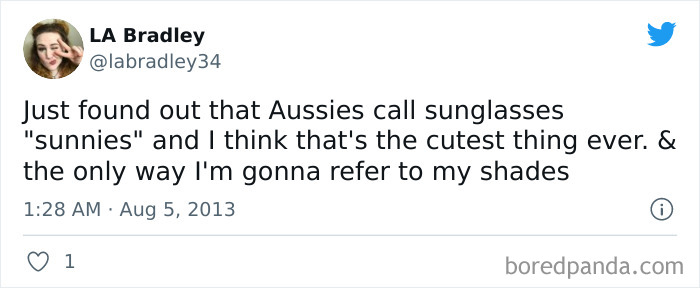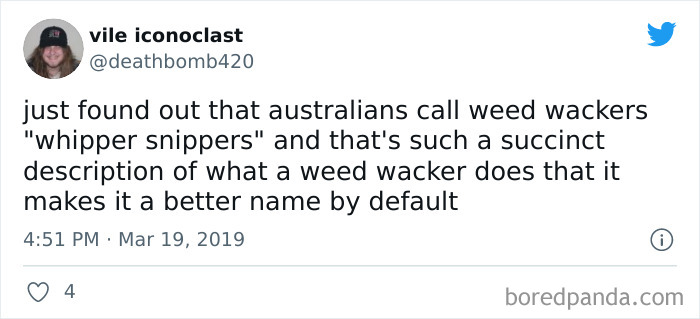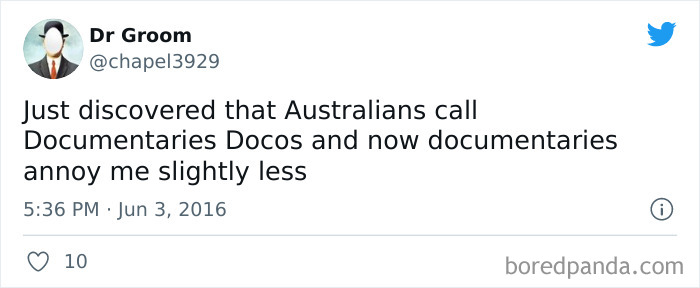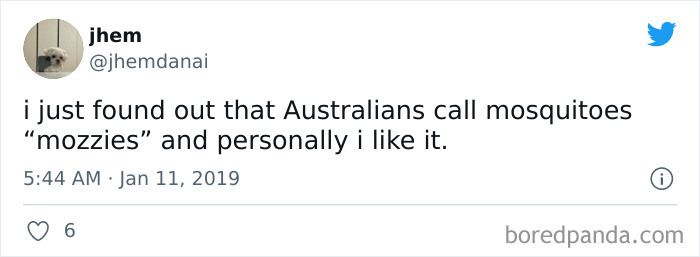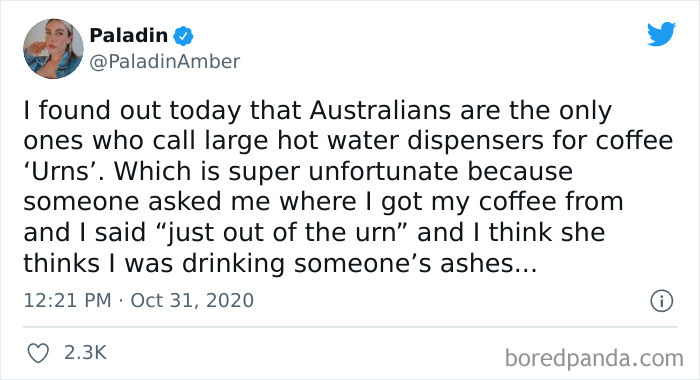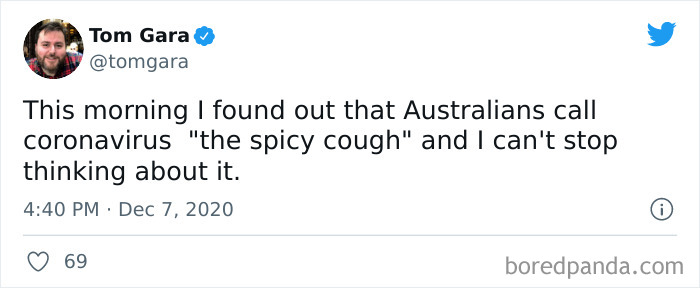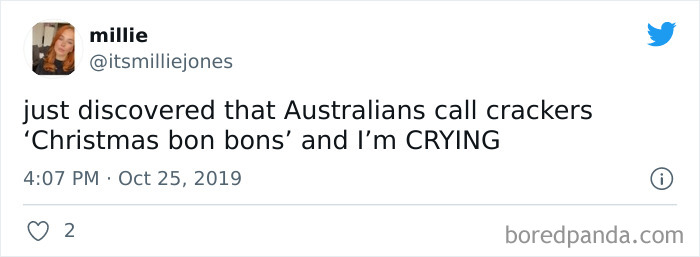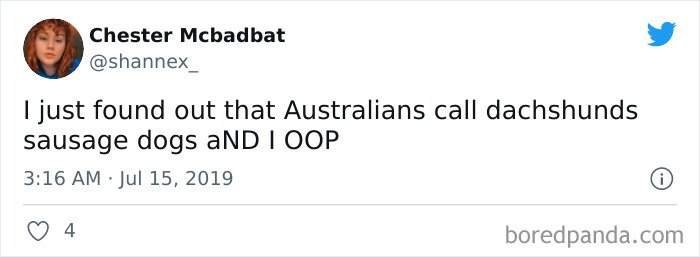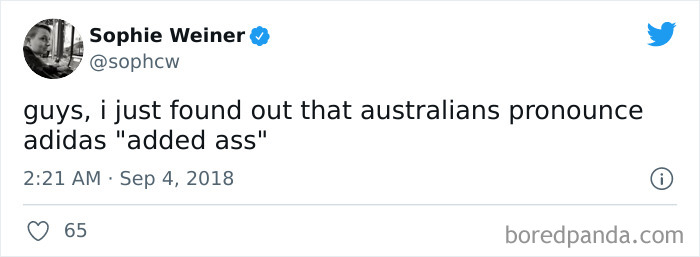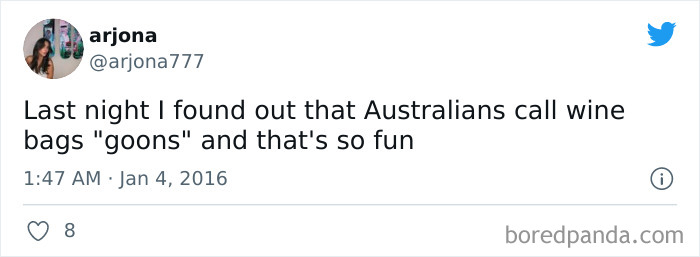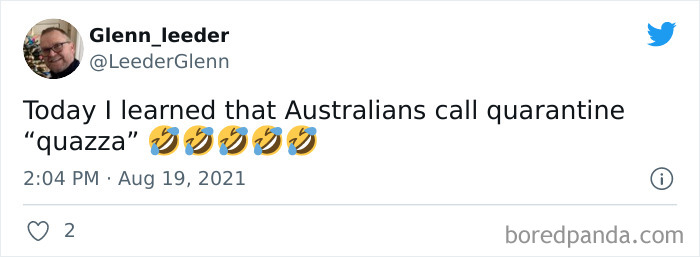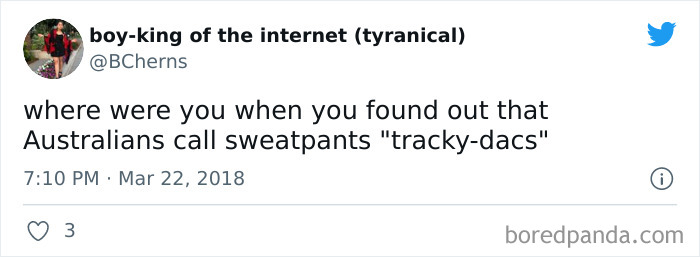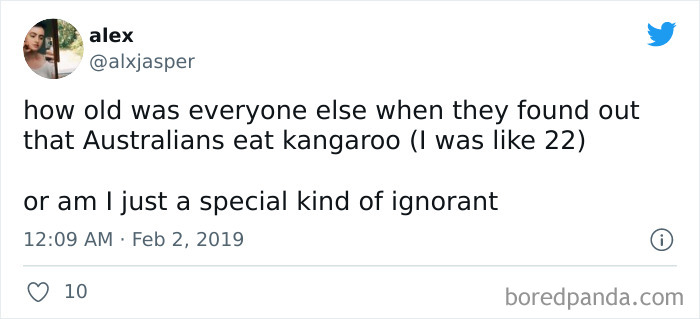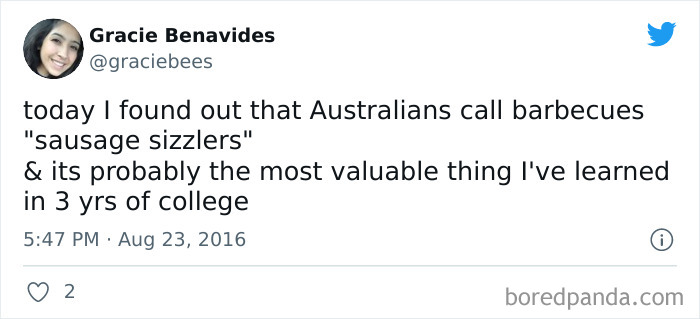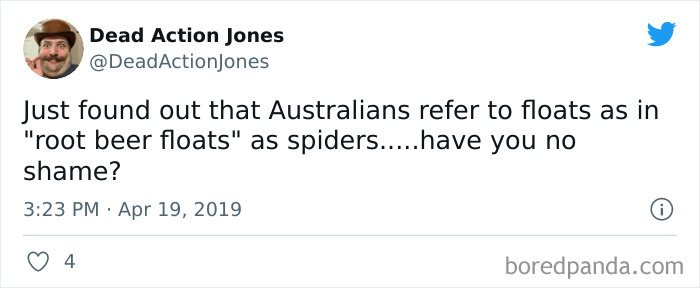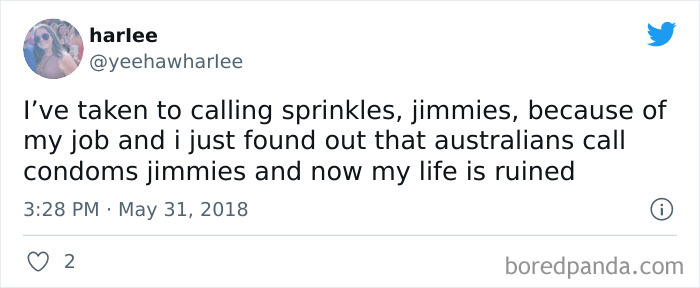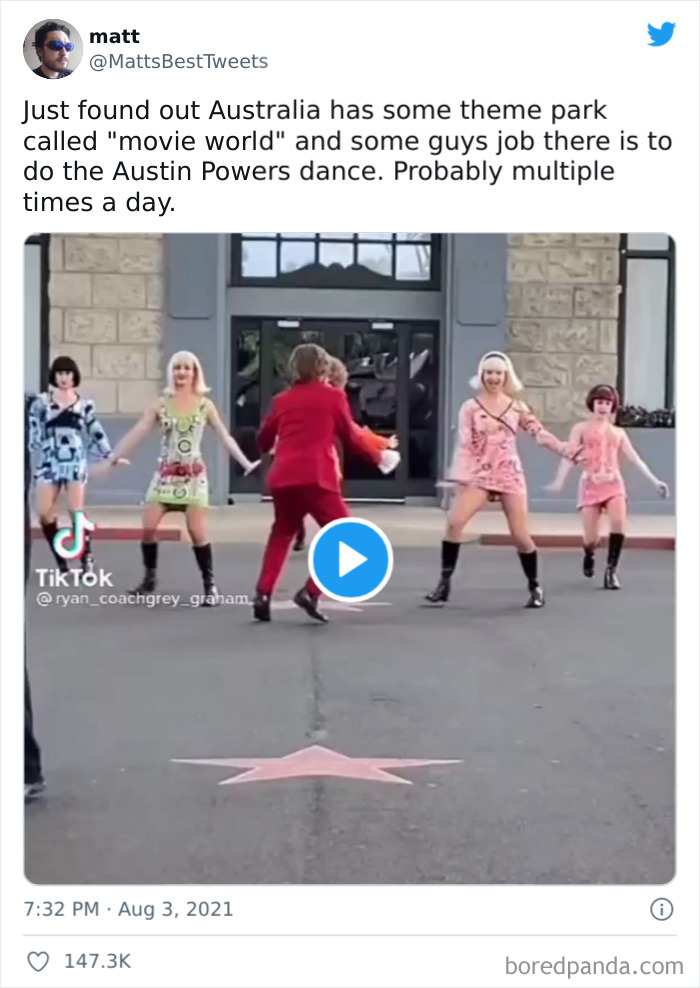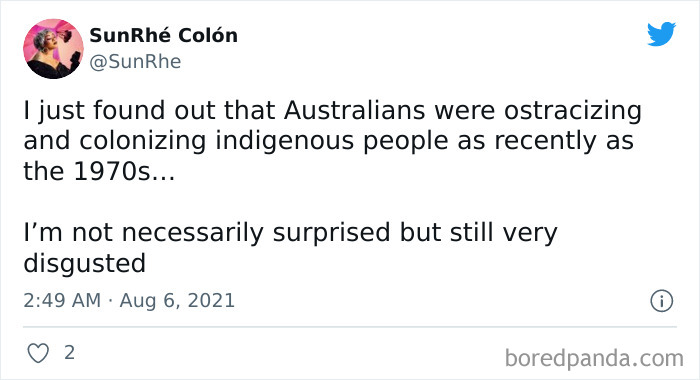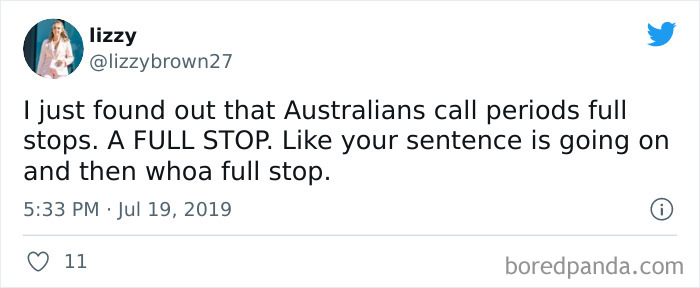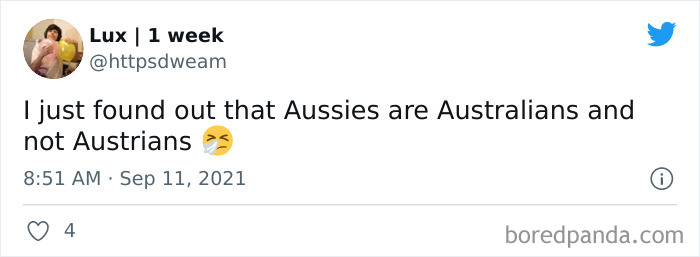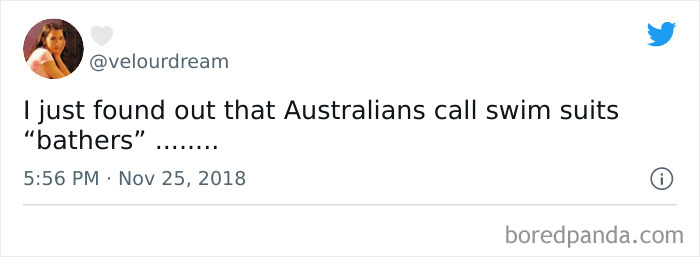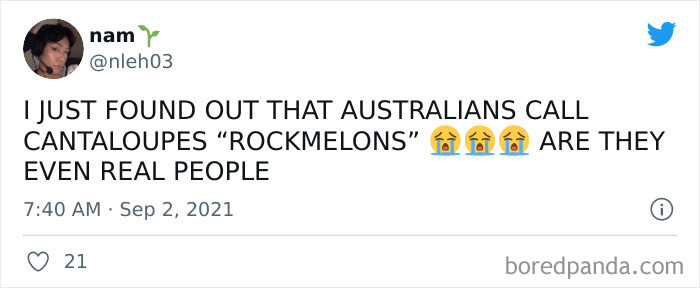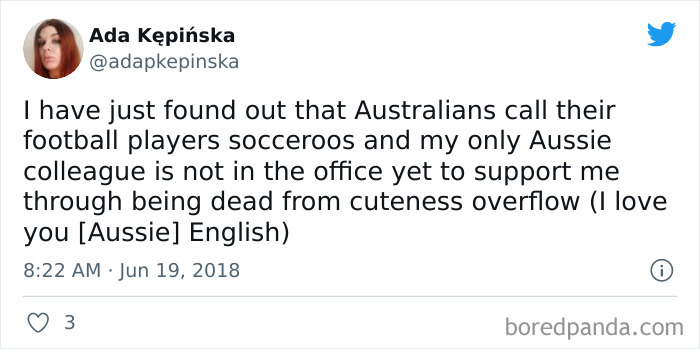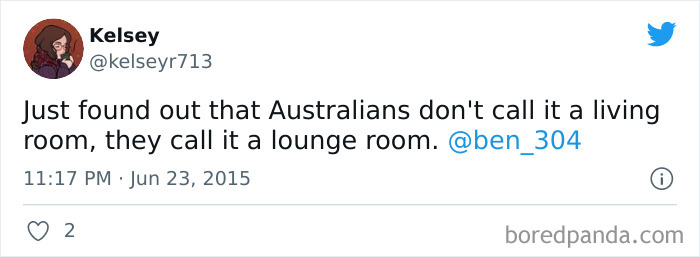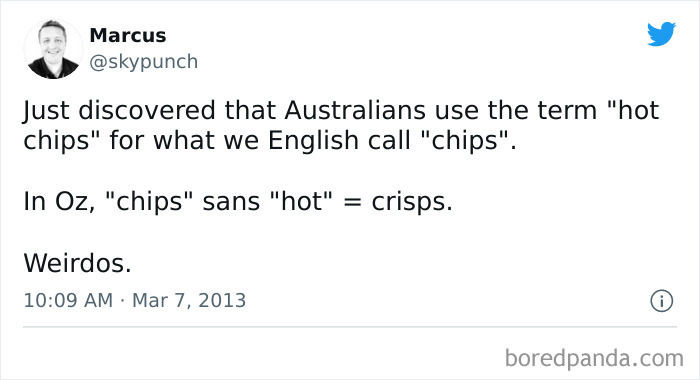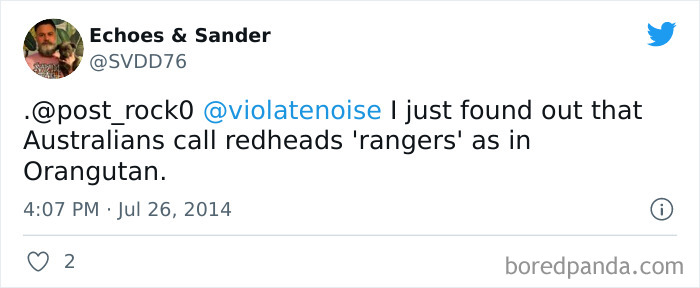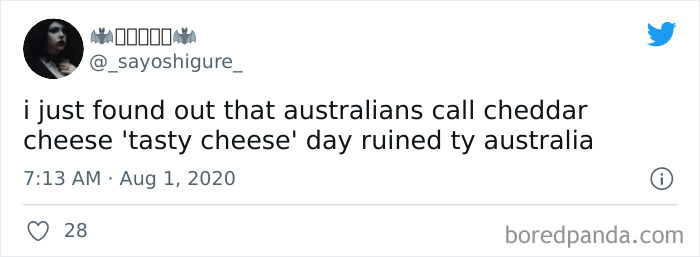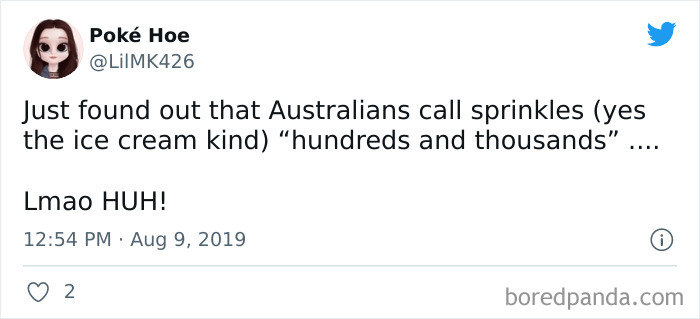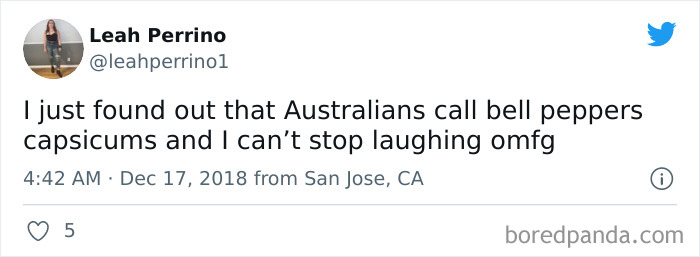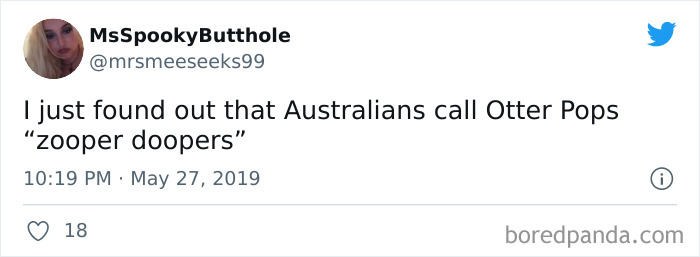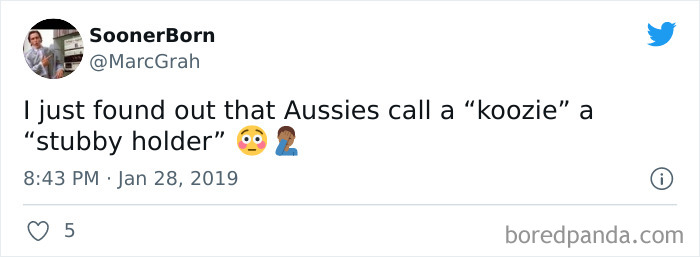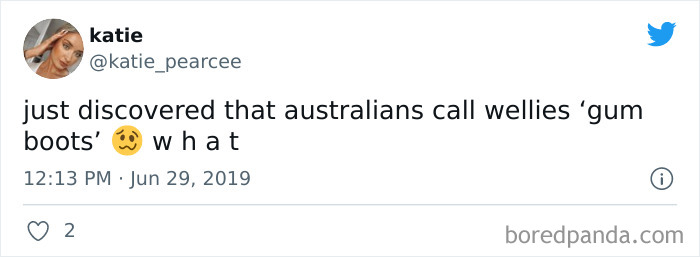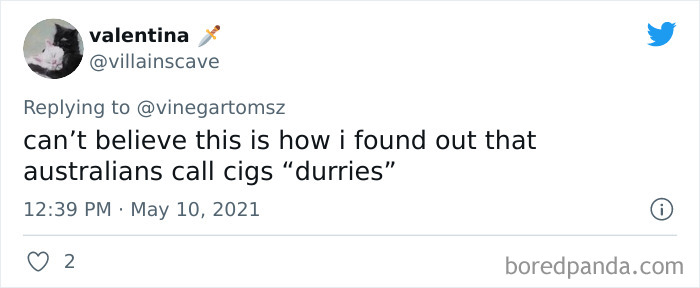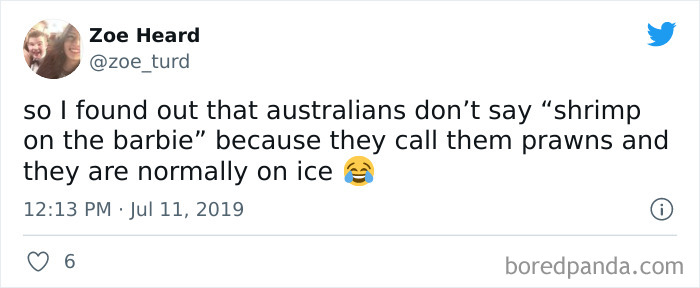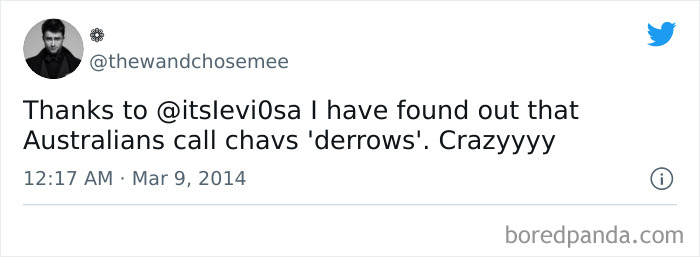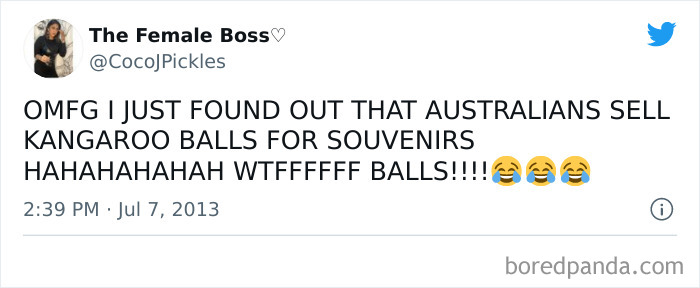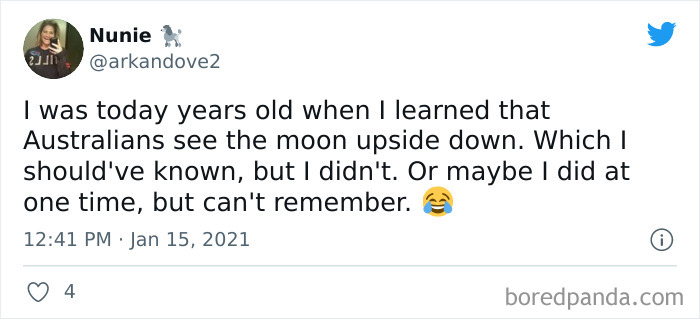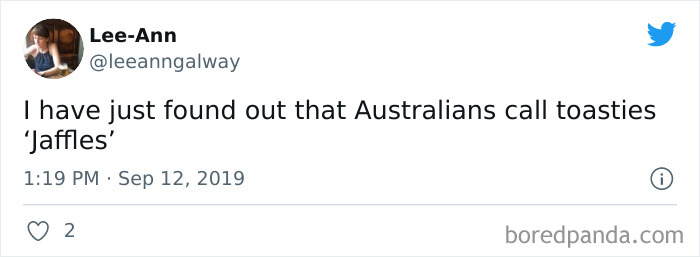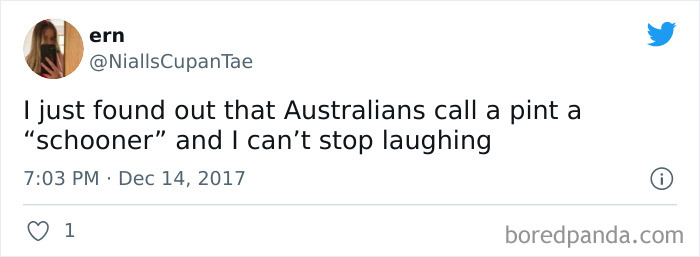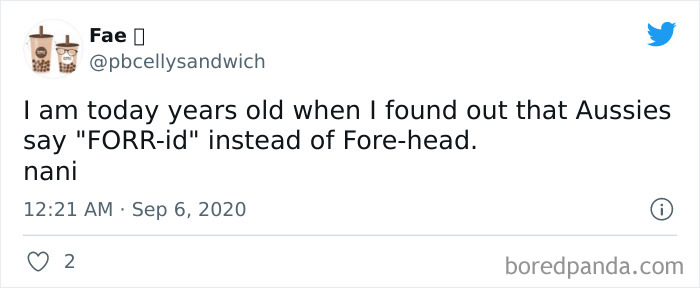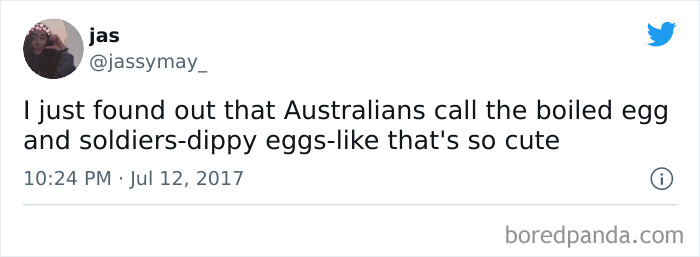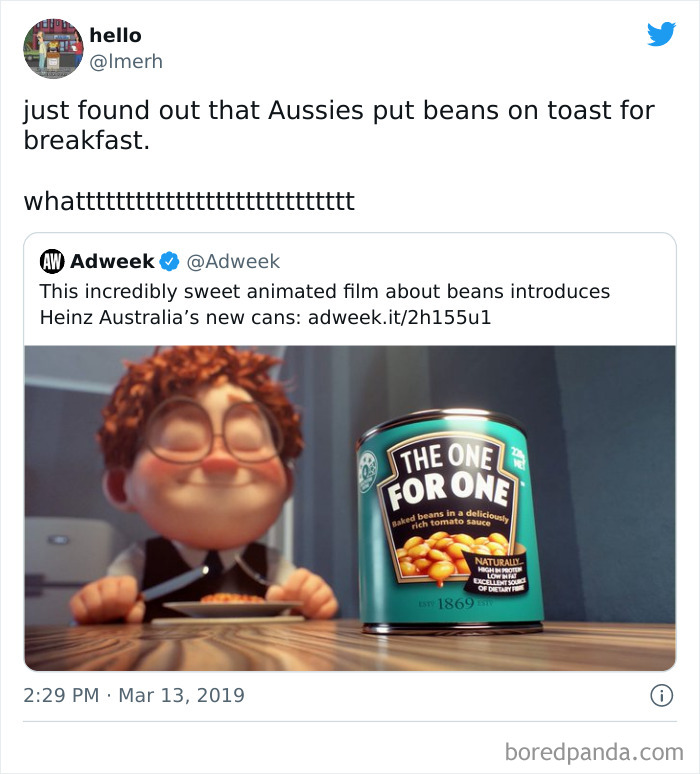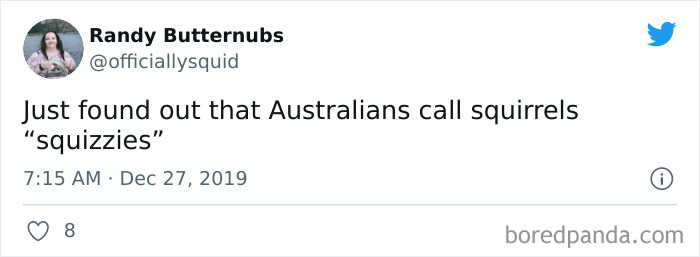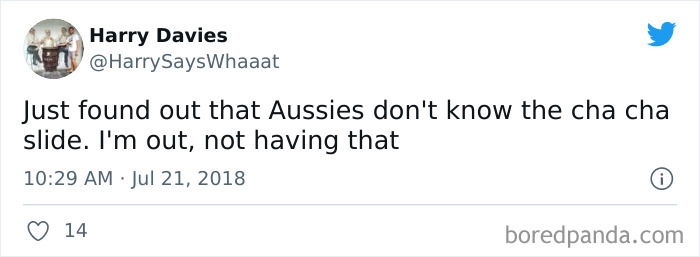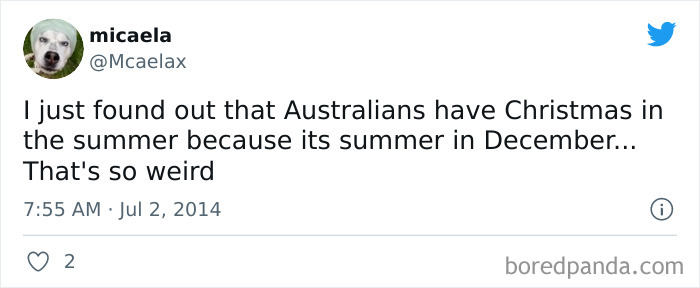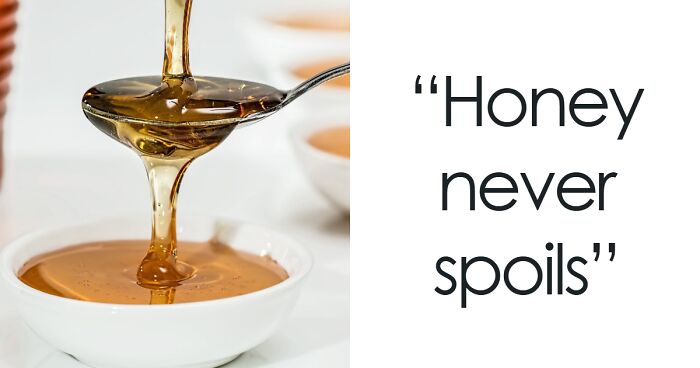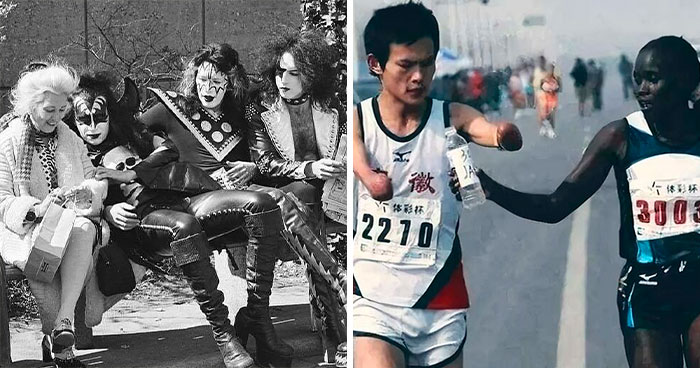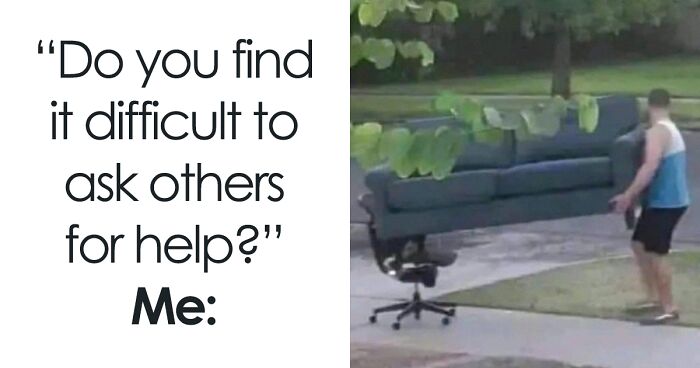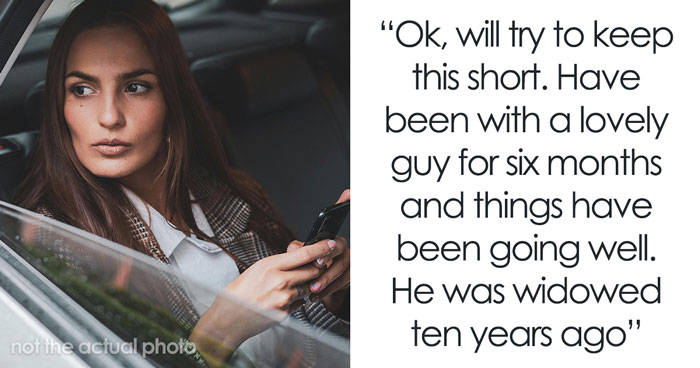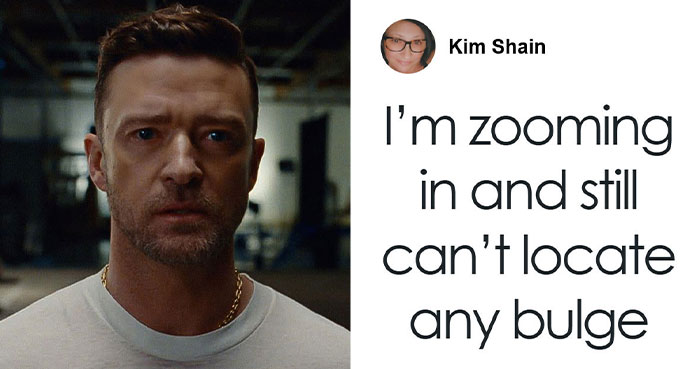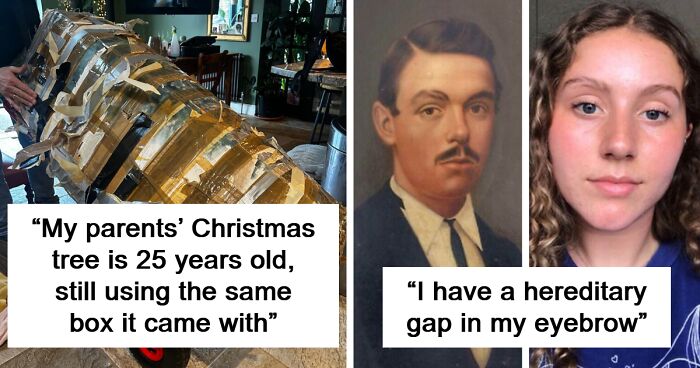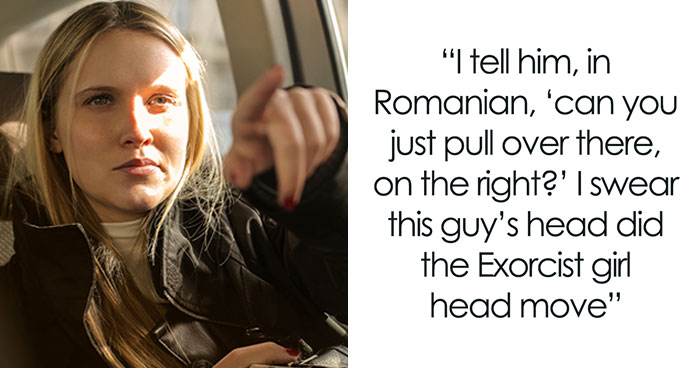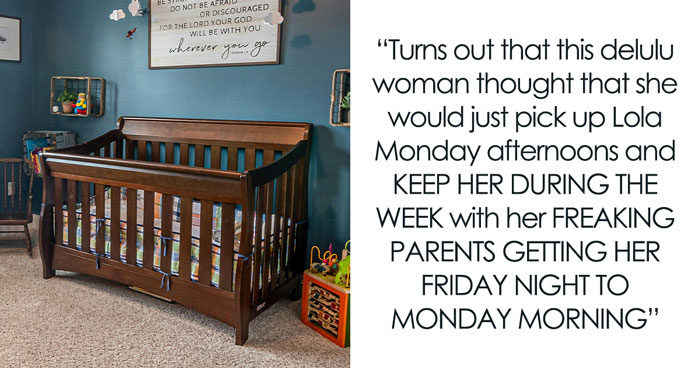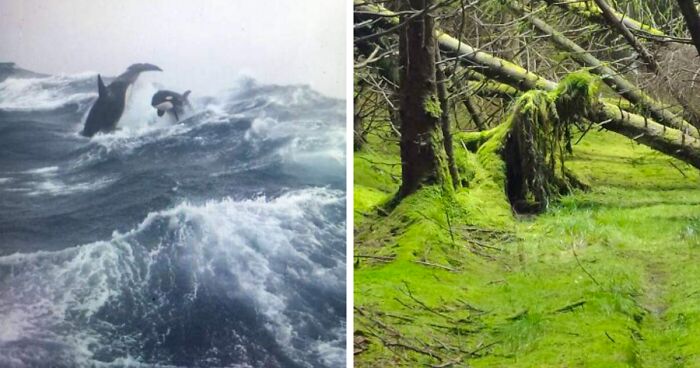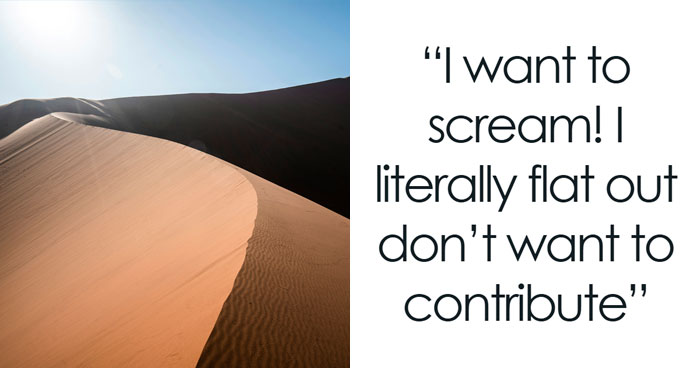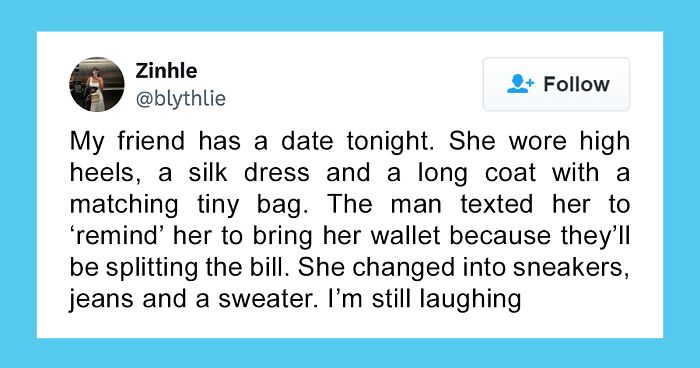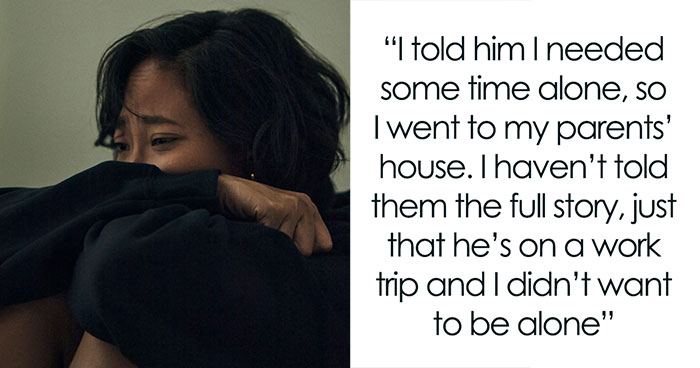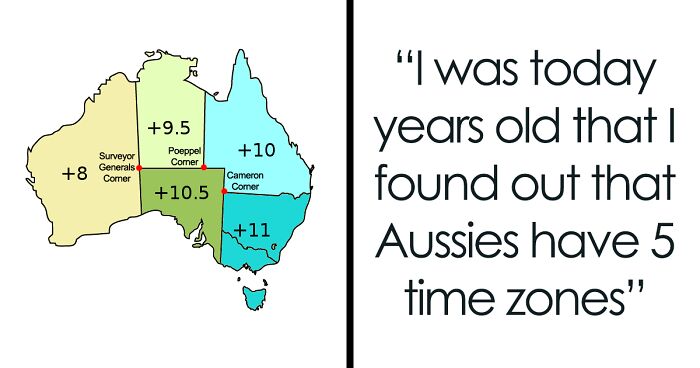
30 Funny Things Non-Australians Found Out About Australia And Can’t Stop Laughing At
Quick, Pandas, what are the first few things that pop into your mind when I mention Australia? If we were to go by stereotypes alone, odds are that you might have thought along the lines of poisonous wildlife, koalas, kangaroos, boisterous yet friendly locals, God-tier surfing, delicious barbeques, and all-around having a great time at the beach. However, Australia is far more than just what we learn about it from movies, TV shows, and the news (though those can help us get a better handle on the culture). And a lot of the magic lies in the language.
Sure, we might all be speaking English, but Australians have a whole host of colorful phrases, fun expressions, stunning slang and take some truly magnificent linguistic liberties that are just as impressive as the country’s vast biodiversity. And Bored Panda has traveled all over Twitter to share how non-Australians reacted when they learned about some of these interesting turns of phrase, as well as a sprinkling of some other interesting Aussie facts. Cultural quirks that we love? You bet! Of course, keep in mind that some of these phrases are just the internet having fun and taking the mickey.
Scroll down, upvote your favorite tweets, and let us know which of them made your day the most, dear Pandas. Personally, I think that saying ‘fairy floss’ instead of candy floss and calling astronauts ‘Austronauts’ is truly, deeply ingenious.
I was curious to learn about how differences in the same language develop in different places, how expressions get entrenched in languages, and how we can become more aware of fun linguistic tendencies in our native tongues, so I reached out to Lisa McLendon at the University of Kansas.
"Any living language is always changing, and different regions/groups/subcultures take the language in different directions," she told Bored Panda, adding that geography is also a "significant factor" in language change. Lisa is the William Allen White Professor of Journalism and Mass Communications and the coordinator of the Bremner Editing Center at KU. Scroll down for the full interview.
This post may include affiliate links.
Lisa from KU shared with Bored Panda how certain expressions, like the fun Australian phrases featured in this article, become part of our everyday life and win out over alternatives.
"Some new words and phrases catch on quickly because they refer to something new: an object, an action, a job. Think about all the terms surrounding social media that didn’t exist 10 or 15 years ago. When a new thing comes along, we have to call it something," Lisa explained that innovation can drive changes in language.
The funny thing is that our public holiday is not actually on the Queens birthday.
Popularity via media can be another way how slang spreads. "But then there are slang words and words that shift in meaning. Sometimes those move into the mainstream from a specific region, group, or subculture. How? One way is media: say a popular TV show, movie or song uses a word—lots of people are then hearing the word and it can make the transition from niche to national."
Though not all expressions can boast about their longevity. Some are simply fads that fade into obscurity far too quickly while others become part of the essence of the language itself. "Sometimes these are a 'flash in the pan'—popular for a short time but quickly pass. Sometimes they stick around and are adopted into the lexicon. Why? It depends on a lot of factors that aren’t entirely predictable, such as whether the term is useful or adds something needed in the language."
Lisa noted that nobody can force expressions to be adopted, this process needs to be natural. "The move needs to come from the users of the language: Most changes imposed from the 'top down' don’t stick."
What's more, Lisa told Bored Panda how we can become aware of some of the more interesting aspects of our language, such as all the colorful phrases that we use.
"The easiest (and most fun) way is through media from other cultures that speak the same language. For instance, if you’re an American English speaker, you’re in a new world of words when you watch Australian or British shows or movies, or even ones from the US that focus on a region or group different from your own. Language is a rich and beautiful thing, and with all the streaming options available now, it’s easy to find something that doesn’t have the 'same expressions all the time.'"
Professor Christine Vogt, who heads Arizona State University’s Center for Sustainable Tourism, explained to Bored Panda that we should all take the time to learn about local customs and the language before heading abroad. In this case, it might mean catching up with Australian slang. This article might be a small primer, but you can find a more comprehensive list right here.
"More than likely that is what draws a person to visit a certain place. The more local knowledge a traveler has, the more a traveler can feel like a local and fit in," Christine told Bored Panda during an earlier interview.
Well this guy is calling his poodle cocker spaniel cross the wrong thing now, he should be calling it a spoodle. A sproodle is a Springer spaniel poodle cross. We also have the much better name for a golden retriever poodle cross, groodle. I mean what dumb person calls them goldendoodle, it's as bad as cockerpoo.
"Local customs can include how a traveler dresses, eats, uses a cell phone, etc. When a traveler is out in a community such as walking in a downtown area or eating in a restaurant, these local customs can come into play,” the expert said.
“For example, in Buddhist countries, a woman who has not covered her shoulders or legs may not be allowed into temples or even a restaurant. Learn as many local customs as you can and a few key words to enhance your experience," the professor said that we should learn to adapt to the local cultures so we can enjoy them to the fullest. It’s best to participate them instead of looking in, lost, from the outside.
Canadian here - around here we call them that too (though it might be a local / regional thing)
As I wrote in my earlier article about Australia being the ‘Land of Nope,’ there’s a lot of wildlife there that might make visitors to the country pause for a bit and reorganize their life priorities. Around 100 of the 170 snake species living in Australia are poisonous. Meanwhile, 21 of the world’s 25 most venomous snakes also call the Land Down Under their home. However, casualties are few and far between.
That's actually a common shortening/nickname for many things in Australia. Documentarys are doccos, people named Dave can be Davo, service stations are servos, bottle shops are bottle-os.
What’s more, Australia’s also home to over 2.4k different species of arachnid. Though, keep in mind that fewer than 50 Australian spider species actually pose a threat to people. All the others are fairly friendly. One thing that should definitely help you get over the creepy crawlies is the colorful slang and the friendly locals. Australia’s more than its snakes and spiders. So much more.
That reminds me of Morecambe and Wise. "Tea Ern? Haha tea urn!"
Load More Replies...Yeah, I've lived all over the US and it's called a coffee urn everywhere.
Load More Replies...I have heard large coffee dispensers called "urns" my entire life here in America.
Me too. And I'm in the restaurant biz, and I have always heard large tea dispensers called the same.
Load More Replies...They are not the only ones, that's what we would call it in Ireland too.
Again used in Canada too. A lot of these terms are used in other countries but maybe not the US. I guess that makes the Aussies closer cousins to us!
Yup. Canadian. Also have heard this used here.
Load More Replies...No, we use urn in America for large pots that have a spigot on the side.
Not sure where this person lives but we call them that here in Canada too
Um....we say that in America too. This person must be from outer space.
I live in the U.S. and I have always heard of coffee urns. They were usually used for large gatherings as they were big.
That's not true. I've heard that my entire life in the American Midwest
I have only ever seen coffee urns in community centres, churches or halls you can hire.
Load More Replies...That is what they are called in restaurants that serve gallons of the stuff and hot water Urns for Tea!
We say urn in U.S. ... especially caterers..... One urn of coffee & one urn of hot water for tea....
Urn is a Big pot for hot drinks. Flask is a small personal one for individuals.
I'm an American, and I call those large, church-basement coffee pots, urns.
A large vessel for tea or coffee is, by definition, an urn, and has been for decades in the U.S..
What did they think urns were, before they started dumping dead people in them?
Today I learned that Americans are the only English speaking country that doesn’t use the term hot water urn or tea urn.
I've always referred to a large/commercially-sized coffee or hot water dispenser an "urn" here in the US. I've never been given a funny look while saying it either.
The OP must be really young or have a thick accent that the person s/he spoke to didn't understand what s/he was saying. "Urn" is a common word in the US for a large pot with a spigot for coffee, tea or hot water.
We still use "coffee urn" in the US, too, but only to refer to the actual, old-fashioned, metal behemoths still in use at churches, retirement homes... pretty much any place where there's someone old enough to have used it when it was new.
I LOLd at this but we totally use urns in South Africa. Very common in offices where you want hot water for coffee for lots of people all the time without waiting for kettles.
We use [coffee] "urn' all the time in America, esp in catering or hospitality.
Yeah, Australians are the only ones except all the other non-American English speaking countries...
It can be annoying when auto correct kicks in. Had a friend at work fill out a health and safety incident regarding our hot water urn. "Burnt my hand when struck by the boiling hot water from the Urine. Poor thing hit save and send before checking and then had lots of explaining to do to the Gen Mgr and OH&S rep:)
I found out today that Paladin is the only person who doesn't know what a coffee urn is.
I've always heard them called coffee urns also. In catering they are called coffee urns!
We talk about "urns" for storing and dispensing hot beverages in South Africa too.
This is not true. I grew up right here in Florida, and it was my job as a kid to tell my mom when the coffee urns were running out at church pot luck suppers.
Actually Australian's wouldn't drink coffee out of an urn - we have too much taste to drink coffee that is been sitting there for ever. You might use an urn for hot water which you can then use to make a coffee (instant) or a tea - but never have an urn of coffee - the thought gives me nightmares.
Apparently you've not been around many coffee drinkers. The only difference between an urn and a coffee maker is that an urn makes 50 cups at one go... and in a group of coffee drinkers, that will be gone in half an hour. Instant??? Never.
Load More Replies...Really? Just because a handful of people call it something doesn't mean it's an Aussie term. Another one I have never heard before.
The term derives from Sylvanus Bowser, American inventor of the first self-service fuel pump
Given it's a German brand, I don't think you pronounce it properly either.
Yes, so do we Brits. Could this be because Australia is a British colony?
We also play Goon Roulette! It's like Spin the Bottle, except you hang a goon bag from the clothesline, get a bunch of friends to stand around it in a circle and then spin the clothesline. If the goon bag stops near you, you drink! Then spin again!!
TLDR - Americans find it hilarious and weird because other people say different things to them.
When I think about it, I'm fine with the concept of being amused by words other people use. If it becomes a double-entendre for you, that would be funny. So maybe the problem isn't that they found it funny, but more the "why" and "how" they found it funny. There seems to be some sort of underlying arrogance to these posts where the authors are saying "these silly Australians are using wrong words", which is condescending. And then there is the "shock" that different words are used, which is ignorant. But maybe I'm reading between the lines too much.
Load More Replies...Many of these are British English and are used in the UK and many other English-speaking countries, rather than being anything specific to Australia.
People should not make assumptions as to how others speak from different countries. I love reading about Australia. I think it would be an amazing place to visit. Perhaps this would have been better if it were people asking what things were called rather than assuming the information they posted was true. It seems that most of these were incorrect and some may have been offensive to the Australians. I like how they defended themselves and gave the correct information.
Most of these were complete rubbish, half of the rest were inherited from Britain, some of these could be regional, a couple were correctly in use and ABSOLUTELY none of them will make you change your life, cry with laughter or question your entire belief system....
The term whipper snipper changed my life. I get a real giggle when I have to trim my lawn, just by adopting that small name.
Load More Replies...This thread could have been called "Here's a list of arrogant, ignorant pricks who think they own the English language."
Whoever startet this phrase „I was today years old…“ Sorry, this doesn‘t make sense.
If anyone interested in actual facts (researched) on Australia and our differences etc check out https://www.boredpanda.com/gday-from-straya-15-posts-about-the-weird-and-wonderful-we-have-to-offer/?utm_source=google&utm_medium=organic&utm_campaign=organic
It's one of my first articles so the layout is not the best. And yes I'm plugging myself lol.
Load More Replies...The amount of inaccuracies in this post is ridiculous! 😂 I've never heard of most of these. I don't know where the heck they're getting this information from. 😂
Midge biscuit - If you watch Fox News, you'll see you can just pull stuff right out of your a**e ;-)
Load More Replies...I think Americans need to get out more. A lot of these are either fairly universal or not even common in Australia.
they get the general attitude though. There's no set of abbreviations, but we all have our own ones
Load More Replies...So many of these so called Australian words I have never heard of! I'm a 61 year old Aussie.
Cockies = cockatoos. Apparently cockies = cockroaches in the US. Which explains why people weren't happy when I said we had dozens of wild cockies visit and I fed them every day. 😅
I'm picturing the scene in Beauty and the Beast where Beast is covered in birds. Beautiful. Now I'm replacing those birds with big fat cockroaches...
Load More Replies..."I just found out that Australians call **my ridiculous regional name for something** by **a different ridiculous regional name**! " Some of it was interesting, though.
Hmm...so characterizing everyone in a country by the things a few of them say or do is at best inaccurate and at worst downright offensive. Got it. I can't help but feel I've seen this somewhere else recently...
one you forgot is we call americans "seppos". shortened from "septic tank" which is rhyming slang for "yank"
This is way too funny to me. I'm not even insulted, either. Is "seppo" a regional word? What part of Oz?
Load More Replies...I'm wondering if Aussies don't just make some of these up on the spot just to f**k with tourists. I'm wondering because it's what I'd do.
There's a good few on here that's regularly said here in Scotland. But even at that haven't these people ever watched neighbours? Not one of these surprised me
That is because Maccas in unmentionable (rubbish food for bogans),
Load More Replies...I found a lot of these rather embarrassing... not being aware there was a southern hemisphere... beans on toast... I can say that all the Americans that I know and love are fully aware of most of these things, we're not all benighted.
Seems like some of theses things they learned came from those ridiculous Foster Commercials judging by the Aussie responses.
TIL that a lot of pandas have ludicrous over-reactions to Aussie terminology
Lots of these entries aren't purely Australian. I'm English and I use a large number of these words/terms.
Americans need to get out (of the US) more. And if you did, you'd notice, that like your own language, most of it is derived from the UK regions (brolly, urn, le weekend), (depending on which region the colonists or prisoners sailed from). Likewise many commonly used words entered English usage the same way (bungalow, jodhpurs). Cofvefe is an all-American term that has travelled well (for all the wrong reasons)😄
They left "ute," "brekkie" and "prezzies" off the list. I've watched enough Australian TV to know those are the names for SUV, breakfast and presents.
As a born and raised Aussie it is enlightening to know that other countries don't call it this stuff, also some of this is completely random XD
TIL that Australians nick most of their sayings from England.
Seeing as Anglo Saxon Australians originated from England and then the huge influx of Britain's coming over as 10 pound poms, what would you expect.
Load More Replies...Where I live in Canada, we are lucky enough to have an Australian restaurant. Most of the dishes are very close to standard Canadian, but include ingredients (when available) such as Kangaroo, emu, croc, & others.
We have hot dogs and corn dogs in Australia, but we call corn dogs, Dagwood dogs and hot dogs are called hot dogs. You will find hot dogs at pretty much every fish and chip shop, many servos and cafes and supermarkets etc. Dagwood dogs aren't as common but they sell them in the supermarket, events and some takeaway joints.
Load More Replies...I actually did write an article with actual research and facts about Australia and also our differences.
Load More Replies...This is about the stupidest page I've ever seen on Bored Panda. Slang is often pretty regional, And do not take too much note of the Macquarie Dictionary anyway, It is mostly Melbourne or Victorian, usage
I feel like this whole article is just Americans treating people from Australia like they're those little dogs people put in their handbags. This is why no one likes you America, stop acting like like the rest of us are here to amuse you.
TLDR - Americans find it hilarious and weird because other people say different things to them.
When I think about it, I'm fine with the concept of being amused by words other people use. If it becomes a double-entendre for you, that would be funny. So maybe the problem isn't that they found it funny, but more the "why" and "how" they found it funny. There seems to be some sort of underlying arrogance to these posts where the authors are saying "these silly Australians are using wrong words", which is condescending. And then there is the "shock" that different words are used, which is ignorant. But maybe I'm reading between the lines too much.
Load More Replies...Many of these are British English and are used in the UK and many other English-speaking countries, rather than being anything specific to Australia.
People should not make assumptions as to how others speak from different countries. I love reading about Australia. I think it would be an amazing place to visit. Perhaps this would have been better if it were people asking what things were called rather than assuming the information they posted was true. It seems that most of these were incorrect and some may have been offensive to the Australians. I like how they defended themselves and gave the correct information.
Most of these were complete rubbish, half of the rest were inherited from Britain, some of these could be regional, a couple were correctly in use and ABSOLUTELY none of them will make you change your life, cry with laughter or question your entire belief system....
The term whipper snipper changed my life. I get a real giggle when I have to trim my lawn, just by adopting that small name.
Load More Replies...This thread could have been called "Here's a list of arrogant, ignorant pricks who think they own the English language."
Whoever startet this phrase „I was today years old…“ Sorry, this doesn‘t make sense.
If anyone interested in actual facts (researched) on Australia and our differences etc check out https://www.boredpanda.com/gday-from-straya-15-posts-about-the-weird-and-wonderful-we-have-to-offer/?utm_source=google&utm_medium=organic&utm_campaign=organic
It's one of my first articles so the layout is not the best. And yes I'm plugging myself lol.
Load More Replies...The amount of inaccuracies in this post is ridiculous! 😂 I've never heard of most of these. I don't know where the heck they're getting this information from. 😂
Midge biscuit - If you watch Fox News, you'll see you can just pull stuff right out of your a**e ;-)
Load More Replies...I think Americans need to get out more. A lot of these are either fairly universal or not even common in Australia.
they get the general attitude though. There's no set of abbreviations, but we all have our own ones
Load More Replies...So many of these so called Australian words I have never heard of! I'm a 61 year old Aussie.
Cockies = cockatoos. Apparently cockies = cockroaches in the US. Which explains why people weren't happy when I said we had dozens of wild cockies visit and I fed them every day. 😅
I'm picturing the scene in Beauty and the Beast where Beast is covered in birds. Beautiful. Now I'm replacing those birds with big fat cockroaches...
Load More Replies..."I just found out that Australians call **my ridiculous regional name for something** by **a different ridiculous regional name**! " Some of it was interesting, though.
Hmm...so characterizing everyone in a country by the things a few of them say or do is at best inaccurate and at worst downright offensive. Got it. I can't help but feel I've seen this somewhere else recently...
one you forgot is we call americans "seppos". shortened from "septic tank" which is rhyming slang for "yank"
This is way too funny to me. I'm not even insulted, either. Is "seppo" a regional word? What part of Oz?
Load More Replies...I'm wondering if Aussies don't just make some of these up on the spot just to f**k with tourists. I'm wondering because it's what I'd do.
There's a good few on here that's regularly said here in Scotland. But even at that haven't these people ever watched neighbours? Not one of these surprised me
That is because Maccas in unmentionable (rubbish food for bogans),
Load More Replies...I found a lot of these rather embarrassing... not being aware there was a southern hemisphere... beans on toast... I can say that all the Americans that I know and love are fully aware of most of these things, we're not all benighted.
Seems like some of theses things they learned came from those ridiculous Foster Commercials judging by the Aussie responses.
TIL that a lot of pandas have ludicrous over-reactions to Aussie terminology
Lots of these entries aren't purely Australian. I'm English and I use a large number of these words/terms.
Americans need to get out (of the US) more. And if you did, you'd notice, that like your own language, most of it is derived from the UK regions (brolly, urn, le weekend), (depending on which region the colonists or prisoners sailed from). Likewise many commonly used words entered English usage the same way (bungalow, jodhpurs). Cofvefe is an all-American term that has travelled well (for all the wrong reasons)😄
They left "ute," "brekkie" and "prezzies" off the list. I've watched enough Australian TV to know those are the names for SUV, breakfast and presents.
As a born and raised Aussie it is enlightening to know that other countries don't call it this stuff, also some of this is completely random XD
TIL that Australians nick most of their sayings from England.
Seeing as Anglo Saxon Australians originated from England and then the huge influx of Britain's coming over as 10 pound poms, what would you expect.
Load More Replies...Where I live in Canada, we are lucky enough to have an Australian restaurant. Most of the dishes are very close to standard Canadian, but include ingredients (when available) such as Kangaroo, emu, croc, & others.
We have hot dogs and corn dogs in Australia, but we call corn dogs, Dagwood dogs and hot dogs are called hot dogs. You will find hot dogs at pretty much every fish and chip shop, many servos and cafes and supermarkets etc. Dagwood dogs aren't as common but they sell them in the supermarket, events and some takeaway joints.
Load More Replies...I actually did write an article with actual research and facts about Australia and also our differences.
Load More Replies...This is about the stupidest page I've ever seen on Bored Panda. Slang is often pretty regional, And do not take too much note of the Macquarie Dictionary anyway, It is mostly Melbourne or Victorian, usage
I feel like this whole article is just Americans treating people from Australia like they're those little dogs people put in their handbags. This is why no one likes you America, stop acting like like the rest of us are here to amuse you.

 Dark Mode
Dark Mode 

 No fees, cancel anytime
No fees, cancel anytime 



